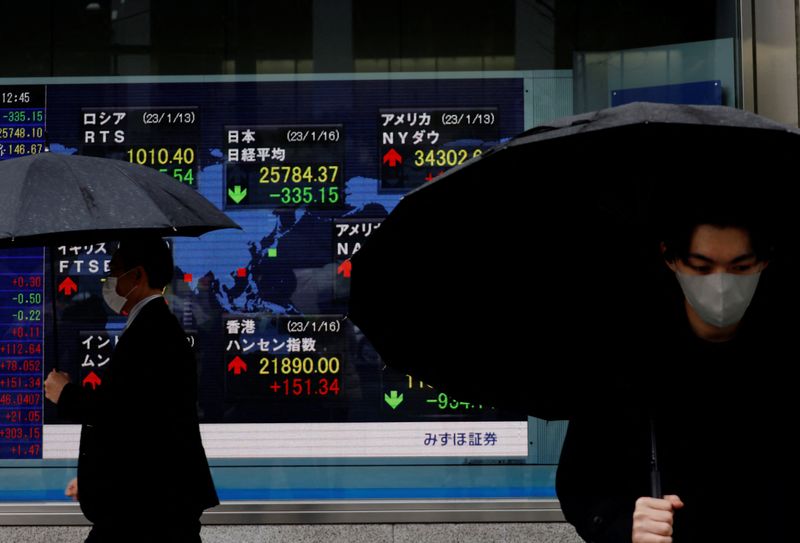 © Reuters. FILE PHOTO: Men walk past an electric board displaying Nikkei and other countries' indexes outside a brokerage in Tokyo, Japan January 16, 2023. The characters on the screen reads,"government bonds". REUTERS/Kim Kyung-Hoon
© Reuters. FILE PHOTO: Men walk past an electric board displaying Nikkei and other countries' indexes outside a brokerage in Tokyo, Japan January 16, 2023. The characters on the screen reads,"government bonds". REUTERS/Kim Kyung-Hoon
By Caroline Valetkevitch
NEW YORK (Reuters) - Global equity indexes rose sharply on Friday, with Wall Street rallying after a jump in Netflix and Alphabet (NASDAQ:GOOGL) shares, while the U.S. dollar had its biggest daily percentage gain against the yen in about two weeks as the Bank of Japan governor repeated the central bank will maintain its ultra-loose monetary policy.
The S&P 500 and Dow snapped a three-session losing streak and the Nasdaq rose more than 2%.
Netflix Inc (NASDAQ:NFLX) gained 8.5% after the streaming video company reported quarterly results late Thursday and said it had picked up more subscribers than expected at the end of last year. Also, its co-founder Reed Hastings stepped down as chief executive. Google parent Alphabet climbed 5.4% after announcing job cuts.
BOJ Governor Haruhiko Kuroda, who addressed the World Economic Forum in Davos, Switzerland, said the central bank will maintain its "extremely accommodative" monetary policy to achieve its 2% inflation target in a stable, sustainable manner.
On Wall Street, the Dow Jones Industrial Average rose 330.93 points, or 1%, to 33,375.49, the S&P 500 gained 73.76 points, or 1.89%, to 3,972.61 and the Nasdaq Composite added 288.17 points, or 2.66%, to 11,140.43.
"We had three down days, so it got into a little bit of an oversold position," which prompted some bargain hunting by investors, said Ken Polcari, managing partner at Kace Capital Advisors in Boca Raton, Florida.
The Dow and S&P 500 still posted losses for the week, along with other equity indexes.
European stocks also closed higher on Friday but marked weekly losses as investors took a cautious view of the earnings season and upcoming central bank decisions.
The pan-European STOXX 600 index rose 0.37% and MSCI's gauge of stocks across the globe (MIWD00000PUS) gained 1.49%. The MSCI global index also was down for the week after posting two straight weeks of gains.
In currencies, the dollar shot up against the yen after the BOJ governor's remarks.
The dollar rose as high as 130.60 yen and was last up 0.9% at 129.51. The greenback had its biggest percentage gain since early January.
"There are some doubts within the BOJ whether the boost in inflation in Japan is going to deliver them all the way back to 2%," said Thierry Wizman, global FX and rates strategist at Macquarie in New York.
At the same time, investors are debating whether the Federal Reserve's aggressive approach to tightening monetary policy to battle inflation might push the U.S. economy into recession.
U.S. Treasury yields rose as investors considered whether the Fed is likely to keep raising rates as far as it has indicated. Also, investors bet that a recent bond rally may be overdone in the near term.
Benchmark 10-year yields were last at 3.482%, after falling to 3.321% on Thursday, the lowest since Sept. 13 and just above its 200-day moving average. The yields have dropped from 3.905% at year-end, and from a 15-year high of 4.338% on Oct. 21.
In energy, oil prices rose and registered a second straight weekly gain as China's economic prospects improved.
Brent crude settled at $87.63 a barrel, up $1.47, or 1.7%. U.S. crude settled at $81.31 a barrel, gaining 98 cents, or 1.2%.

